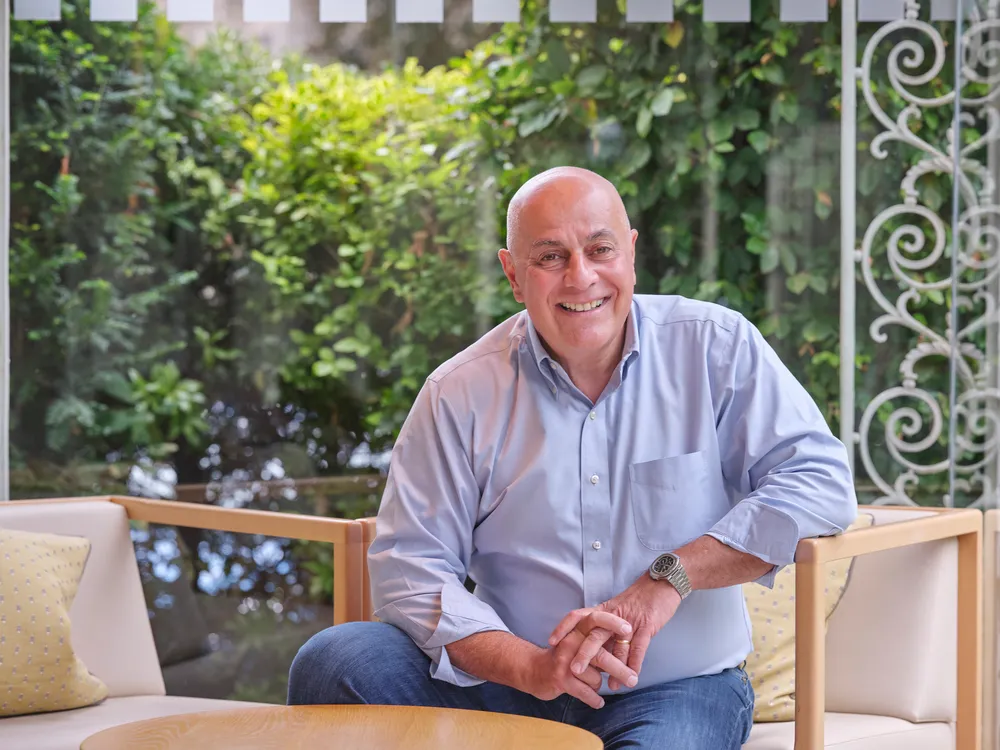By Kirsty Bosley
I’m sitting in the distinctly English reception room of Simpsons restaurant in Edgbaston, patiently waiting to meet the Godfather. The light emanating from a glimmering glasswork chandelier emphasises the nooks of the room’s Georgian coving and intricate panelling.
I’ve been here once before, on a sunny Easter weekend, to dine on what is easily the very best meal of my life. Ten courses of British culinary heaven were served in Simpsons’ bright dining room while little songbirds soared over the manicured lawn, my heart following. Whatever was lost between the time when we used to give praise and dance to celebrate a harvest and today, when we grab stuff mindlessly from a supermarket shelf only to let it go bad in the fridge? It all comes back in a dining room of this calibre. I never thought I’d feel so enthusiastic about a baby gem lettuce. I buzzed with joy.
This time, however, I’m not here for the food. In the pristine white mansion on a tree-lined street, I have an appointment with the lord of this particular manor. Andreas Antona, 66, is a chef of five decades. He has nurtured Simpsons from a little seedling in Kenilworth 30 years ago to an evergreen stalwart of Birmingham’s food scene — our first ever Michelin Star restaurant. The city has five of those now, but that first special star sits proudly embroidered on the breast of Andreas’ shirt. We shake hands and he gently directs people around me. Still water to be brought in, please. Turn that stereo down. Everything happens when he asks it, as he asks it. It’s a quiet sort of power, a respect earned over years as what the Times once called “the Godfather of Modern Birmingham food”.

I begin with an important question. Andreas was born in London — does he consider himself a Brummie? He smiles. “Well, I live in Warwickshire,” he says in a southern accent, “but I’m an adopted Brummie! I love Brummies, they have a great sense of humour. But I’m a complex character. I’m Greek Cypriot, I’m a Londoner, I’m a Brummie — it’s all immaterial to me.”
Where, in all that complexity, does food come into it? “I was born lucky,” Andreas says. “One of the great joys of life is eating food. There’s never been a meal that I haven’t approached with joy in my heart to eat it. There’s nothing greater than that first mouthful… you’re coming alive.”
That deep appreciation started early, when Andreas was growing up alongside his two sisters at the family restaurant. “Food played a central part in our life,” he says. “It revolved around Sunday lunches and getting together to eat.” The restaurant served British roasts and grills, but at home, Andreas ate his mother’s Greek food. “Everything was Greek to me for the first five years,” he says. “When I went to school, I could only speak one English word: ‘hello’. School was always a bewildering experience. I didn’t really get it until I went to catering college. It was an interlude of boredom.”

Instead, the important lessons were learned in the kitchen. “I was about six when I knew I wanted to make food my life. I was doing my homework when my dad came down and said ‘Don’t worry about that rubbish! Go and help your grandad wash plates!’ I saw the opportunity and I never looked back. I would look at the chefs and learned to chop onions and mushrooms. I could cook, but I didn’t know the formality. I went to college with confidence and once I learned classical French cooking, it changed what I wanted to get out of food. It wasn’t working for my dad, it was working for big hotels in the West End of London: The Ritz, The Dorchester and The Savoy.”
After completing his training, Andreas moved to Warwickshire with his wife — fellow Ritz chef Alison Antona — to be near to her family as they started one of their own. They’ve been married for 38 years now, sharing four children. In the early days, Andreas got to know more about what Brummies wanted from food. There seemed to be an appetite for the higher level dining that he himself had fallen so deeply for. “I was head chef of the Plough and Harrow, which was a fine old lady of Birmingham hospitality,” he recalls. “It was at the height of its prowess at that time. Brummies are great travellers. Wherever they go, they want the best of everything, but when they came back home, there was nothing here for them.” Andreas felt that as Birmingham’s reputation as a young, vibrant city grew, the restaurants in town weren’t changing with the times. “Customers that wanted fine dining could go to the Plough and Harrow, maybe Lambert Court or the Eaton, but they were past their sell-by dates.”
And so Simpsons opened in Kenilworth in 1993 with a careful balance between “balanced and pure” cooking and more modern twists and flavour pairings. Within two years it had achieved a Bib Gourmand; by 1999 it was awarded a Michelin Star. I ask Andreas how that felt. “I knew I was cooking at that level. I’d been cooking at that level all my life,” he replies confidently. “I’m not saying I expected it, but it ticked the box. The bigger problem for me was keeping it.” For several years after receiving the Star, Andreas dreaded the night before a new edition of the Michelin Guide would be published.“It was gut-wrenching. It was a nightmare, the idea that you’d have to go back and start all over again,” he says.

By 2004, Birmingham was calling. “I wanted to do more. Birmingham was coming of age, attracting people on business from all over Europe,” he says. “Birmingham is a powerhouse of British industry. You’ve got glitz and glam in Manchester, but it’s nothing in comparison to the economic significance of the greater West Midlands. Birmingham was at the heart of it, but it didn’t have one decent restaurant, in my opinion. The great pride was the Balti Triangle which deservedly got the recognition, but did it have an internationally acclaimed Michelin Star restaurant?”
Simpsons moved to Edgbaston and it’s held fast to the Star ever since. While Andreas jokes that Michelin is “a French tyre company at the end of the day, let’s get real”, he cherishes the recognition, as well as the chance to pass the torch to others. Glynn Purnell trained under Andreas, and he has his own top restaurant in the city now — his namesake Purnell’s, as well as small plates spots Plates in the city centre and the Cafe and Bistro at the Charterhouse in Coventry, both of which also feature in the Michelin Guide. “I always looked at it as supplying someone with a platform,” Andreas says. “It’s up to them what they do with it. If you want to make a name for yourself, go for it. For me, it’s always been about passing on knowledge. The development of humanity is to spread the love, so we can progress.”

That means starting each day on the right foot. “When I come into the kitchen, I shake everyone’s hand and ask how they’re doing. The front of house staff too. It’s important to me to acknowledge everyone’s presence, to show interest. If they’ve got an issue, I want them to know they can say ‘Chef, can we have a cup of coffee?’ It doesn’t have to be cooking, it can be anything. I’ve always promoted a family feeling, rather than a corporate one.” He adds quickly: “Let’s not get carried away — it’s nothing groundbreaking. But it’s who and what I am.”
Andreas’s legacy is wide-reaching. His fingerprints are all over the city’s culinary landscape, from the chefs strengthened by his tutelage to those who enjoy the benefits that come from our reputation as a city that knows good food.
So what now, I ask — retirement? “Retire from what?!” he laughs. “That’s the Greek in me, you know? We don’t have an actual word for retirement. The nearest I’ve got to it is ‘withdrawing from life’. It’s a concept I can’t get into my head.” I ask how he spends his downtime. “I like to play golf,” Andreas says. “Being in nature is calming and rewarding… I’m never going to win the Claret Jug, so why get het up about it?”
Maybe that’s how he could spend his retirement days, I suggest. “What is retirement?” he says. “For me it’s death. That’s when I will retire. When I’m in that box.”








Comments